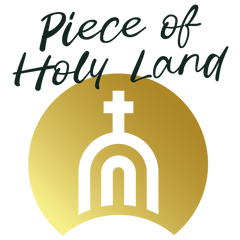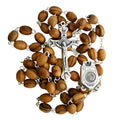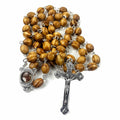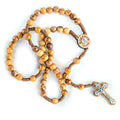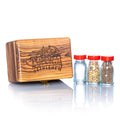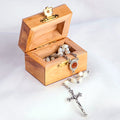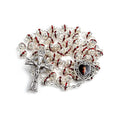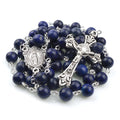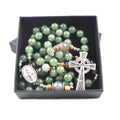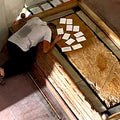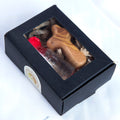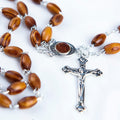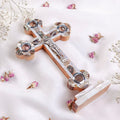Saint Benedict - His Legacy and the Power of the Rosary
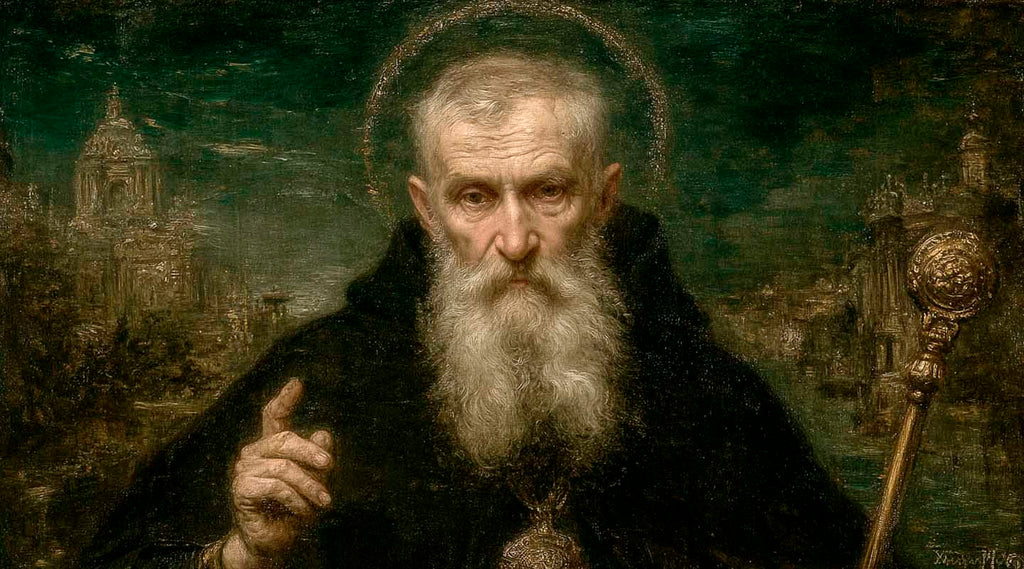
A Journey Through the Life, Symbolism, and Devotion of Saint Benedict
Who Was Saint Benedict?
Saint Benedict of Nursia (c. 480–547 AD) is widely regarded as the father of Western monasticism and a foundational figure in Christian spirituality. Born in Nursia, Italy, into a wealthy Roman family, Benedict was educated in Rome. However, he became disillusioned by the corruption and moral decay he saw in the city and chose a path of solitude, seeking a deeper spiritual life.
He retreated to a cave in Subiaco, where he lived as a hermit and devoted himself to prayer, fasting, and contemplation. His holiness and wisdom began attracting followers, leading him to found several monasteries and, most notably, the great monastery of Monte Cassino. There, he wrote the Rule of Saint Benedict, a guide for monastic life focused on balance, prayer, work, obedience, humility, and community.
The influence of Saint Benedict’s Rule extended far beyond his lifetime and shaped the spiritual formation of countless Christian communities throughout Europe. Today, Benedictine monasteries continue to uphold his vision of a life centered around “ora et labora”, prayer and work.

The Saint Benedict Medal: A Symbol of Protection
One of the most recognized Christian sacramentals today is the Saint Benedict Medal. This powerful emblem is inscribed with Latin prayers and symbols that reflect spiritual strength and protection against evil.

On the front of the medal is Saint Benedict holding a cross and the Rule, with a cup and raven at his feet, symbols from legends of his miraculous protection against poison. The reverse side contains the cross of St. Benedict surrounded by abbreviations for Latin prayers:
-
Crux Sacra Sit Mihi Lux – May the Holy Cross
-
be my light.
-
Non Draco Sit Mihi Dux – Let not the dragon be my guide.
-
Vade Retro Satana – Begone, Satan!
-
Ipsa Venena Bibas – Drink your own poison.
This medal has long been used for protection, particularly in exorcisms and blessings. Its spiritual power is rooted in the authority of Christ, invoked through Saint Benedict’s intercession.
Saint Benedict’s Battle Against Evil
The life of Saint Benedict was marked by spiritual warfare. Many accounts describe him confronting demonic activity, blessing poisoned food and drink to render it harmless, and invoking the sign of the cross to break evil’s hold. These stories are not mere legends but serve to illustrate the power of faith, prayer, and sacramental life in resisting darkness.
This legacy of spiritual protection is why the Saint Benedict Medal is often integrated into religious items, especially rosaries and crucifixes, turning them into spiritual shields for the faithful.
Saint Benedict Rosaries: Devotion and Defense in One
Rosaries that include the Saint Benedict Medal unite the spiritual power of the rosary prayer with the protective grace associated with the saint. Every bead becomes a meditative anchor, while the medal serves as a shield against temptation and evil.
These rosaries are ideal for those seeking peace in difficult times, clarity during spiritual trials, or simply a deeper connection to God through Saint Benedict’s intercession. The Saint Benedict Rosaries in our collection feature sturdy craftsmanship and rich symbolism that combine tradition with spiritual purpose.
Whether carried in a pocket, placed by your bedside, or used daily in prayer, these rosaries bring comfort, focus, and courage.
Explore the full Saint Benedict Rosaries Collection and choose a piece that supports your spiritual journey.
How to Use a Saint Benedict Rosary
To begin praying with a Saint Benedict Rosary:
-
Start by holding the medal, asking for Saint Benedict’s protection and guidance.
-
Proceed with the traditional rosary prayers: the Apostles’ Creed, Our Father, Hail Mary, and Glory Be.
-
Meditate on the mysteries of Christ’s life, asking for strength and spiritual clarity.
You may also offer specific intentions related to spiritual protection, discernment, or intercession for others.
Many believers find comfort in keeping a Saint Benedict Rosary close during travel, important decisions, or challenging moments in life.
Why the Saint Benedict Medal Belongs on a Rosary
The Saint Benedict Medal is more than a charm; it is a rich symbol of Christian resilience. When placed on a rosary, it becomes an anchor for intentional prayer and a reminder of God’s unwavering protection.
These rosaries:
-
Provide spiritual security in the face of temptation or fear.
-
Deepen the experience of prayer through visual and tactile symbolism.
-
Serve as daily reminders of God’s presence and the strength of the saints.
Rosaries with the Saint Benedict Medal are excellent gifts for loved ones going through difficult seasons, or for anyone seeking spiritual grounding and grace.
The Timeless Relevance of Saint Benedict
In an increasingly chaotic world, the message of St. Benedict is more timely than ever. His call to simplicity, prayer, and community life remains a source of hope and clarity for many.
Saint Benedict Rosaries carry this message forward. They help modern believers root their spiritual practice in ancient wisdom, drawing strength from the example of one of Christianity’s most influential saints.
A Spiritual Companion in the Journey of Faith
The rosary has always been a powerful spiritual weapon. When paired with the Saint Benedict Medal, it becomes a prayerful ally against the trials of everyday life. These rosaries are not just devotional tools, they are reminders that we are never alone in our walk with Christ.
Each rosary from our Saint Benedict Collection invites you to deeper trust, steadfast faith, and protection in prayer.
A Final Word of Encouragement
As you hold each bead and meditate on Christ’s mysteries, may Saint Benedict’s intercession guide you, protect you, and inspire you to live with courage, humility, and holiness. Let the prayers of the rosary and the strength of the Saint Benedict Medal fortify your soul in every moment.
Frequently Asked Questions About Saint Benedict and His Rosaries
Q: What makes St. Benedict an important figure in Christian spirituality?
St. Benedict of Nursia is considered the father of Western monasticism. His Rule of Saint Benedict shaped centuries of Christian practice focused on prayer, discipline, humility, and spiritual warfare through faith.
Q: What does the St. Benedict Medal represent in Christianity?
The St. Benedict Medal is a powerful Christian symbol used for spiritual protection. It features Latin inscriptions that rebuke Satan and affirm the power of the Holy Cross. Worn for centuries, it invokes God’s protection against evil influences.
Q: Why do some rosaries include the St. Benedict Medal?
Rosaries with a St. Benedict Medal combine two powerful devotional tools: the traditional prayers of the rosary and the spiritual defense of the medal. Many faithful use these rosaries during times of temptation, illness, or when seeking divine protection.
Q: Is the St. Benedict Medal approved by the Church?
Yes. The medal has been officially endorsed by the Catholic Church for centuries. It is often blessed using a special rite that includes prayers of exorcism and protection.
Q: Can I buy a St. Benedict Rosary online?
Yes, beautifully crafted St. Benedict Rosaries are available online, including options featuring elegant beads, detailed medals, and strong cord or chain construction—perfect for both prayer and daily spiritual strength.
Q: How do I use a St. Benedict Rosary in prayer?
Pray the rosary as usual while keeping the intention of spiritual protection in mind. Many users also recite the Prayer to St. Benedict or the Psalm 91 along with their regular devotions.
Q: Is it necessary to have the medal or rosary blessed?
It is highly recommended. A priest can bless your St. Benedict Medal or rosary using a specific formula that includes prayers for protection and deliverance from evil.
Q: Are St. Benedict Rosaries only for Catholics?
While the medal and rosary have deep roots in Catholic tradition, many Christians of different backgrounds find spiritual comfort in using St. Benedict Rosaries and other devotional items as part of their personal walk with God.
SHARE:

